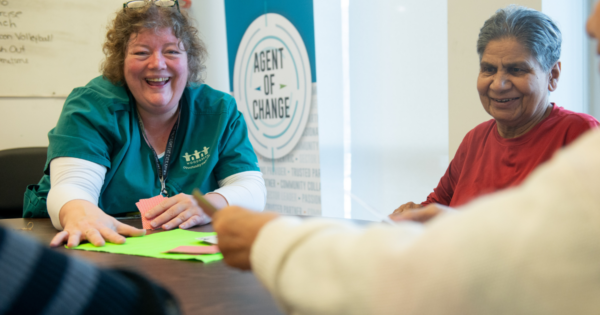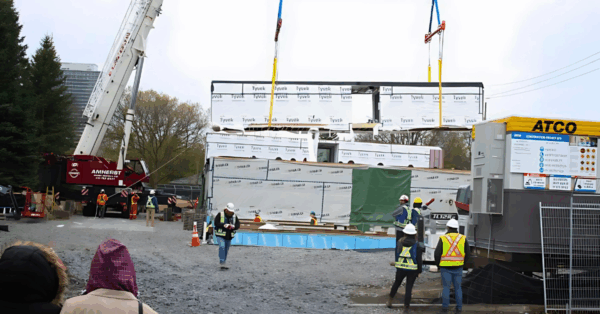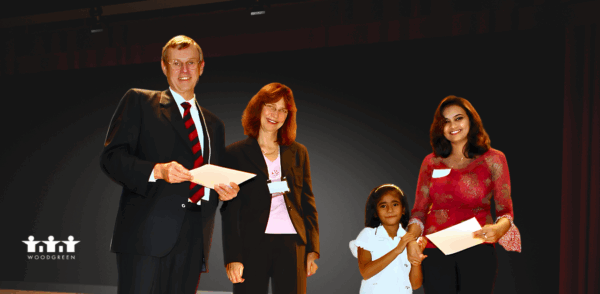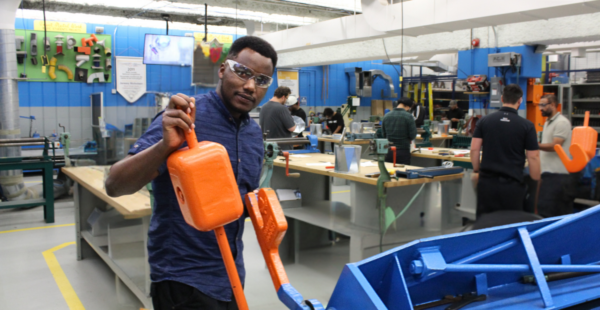Within hours of war breaking out in Ukraine, Natasha Cobchuk, her husband and two children were in a car speeding for the Polish border. Time was not something they had to waste. Their 10-year-old son has a rare genetic disorder that means he needs special food and medicine to survive. They could not risk the war cutting off that supply.
"When you have children, there's no room for mistakes," says Natasha. "It was my job to find a safe place for us all." She speaks to me from the family's new home in Toronto, walking distance from Toronto’s Hospital For Sick Children, the world's leading pediatric hospital.
Six months after arriving in Canada from Ukraine, Natasha says she feels safe and happy. Getting to this point wasn't easy, but she says WoodGreen has had a lot to do with the fact her family now plans to build their future in Canada.
"When you first arrive, you don't know what to do or who to ask for help. You can't just ask anyone because they don't know. They've never been a refugee in Canada. WoodGreen knew. I can call them about anything and I'm so happy WoodGreen exists."
A good life left behind in Ukraine
Coming to Canada was never in Natasha’s plans. “I had worked hard and I enjoyed my life,” says the 38 year-old with a wistful tone. “Then Russia came. And it took all that I had.”
Natasha and her husband, Oleksander, 36, ran a successful event management company in Kyiv, the capital city of Ukraine. They owned two homes, with a maid and a gardener. Natasha was a music teacher and public speaking consultant. Oleksander was an outgoing and animated event host. Their sons, Serge, age 10 and Vlad, age 13 were happy in school and with their friends.
“I didn’t want to leave to find a better life. I had a great life,” she says. “War forced me to move.”

Welcomed by perfect strangers
The family arrived at the Polish border with just their musical instruments, two bags, their children and their lives. Their journey away from the quickly advancing war took them onward to Italy where they learned they could apply for visitor visas to Canada. After searching online, Natasha found a woman in Toronto with the same disease as her son (Phenylketonuria). This meant if the family settled in Toronto they would at least be able to access the medication Serge needs. “My son’s health was my priority,” says Natasha.
An online search led Natasha to a Canadian family willing to take in the Ukrainian couple and their children. In May, the Cobchuks arrived at Toronto airport, greeted by complete strangers who welcomed them into their home for more than a month. “I was so glad to find such nice people in Canada,” she says with a smile. Once the family was out of harm’s way, they slowly began to think about moving forward. The problem was, they didn’t know what to do next.
“Our host family told us ‘There is a person who knows what to do. It’s called WoodGreen’, ”says Natasha. They were quickly connected with Shameem Ahmed, a settlement counsellor in WoodGreen’s Newcomer Program.
“From the very beginning, when we met Shameem, we felt supported,” says Natasha. “She talked to us and asked us our concerns and she gave us friendly care, told us jokes, supported us and we trust her.”

Not refugees, but not tourists
The process for those fleeing the war in Ukraine and coming to Canada is complicated. Though they are escaping violence, they are not classified as refugees, and therefore not granted Permanent Resident status the moment they arrive. Instead, they are considered temporary residents who can work or study for three years in Canada (paying international student fees).
Initially, there was no monetary support for Ukrainians fleeing the encroaching Russian troops. Those without savings or strong enough English to work can face real financial challenges without access to support and services. The government has since introduced a one-time cheque of $3,000 per adult and $1,500 per child and is allowing newcomers from Ukraine to attend language classes.
WoodGreen helps newcomers from Ukraine
WoodGreen launched its Ukrainian Stabilization Program to help newcomers navigate this complicated process. Shameem helped Natasha apply for things like a Social Insurance Number and a Health Card. She gave them welcome baskets full of necessities to make life a little easier in a new country. She connected the family with language classes at the YMCA and even booked an appointment for Natasha to have her already impressive English assessed. Knowing Natasha was skilled at teaching music, Shameem helped her apply to have restrictions on her work permit lifted so she might work with children. She also suggested she volunteer at the Royal Conservatory of Music and helped register Serge and Vlad for school.
“If [Shameem] hears about anything new that could be helpful for us, she calls us,” says Natasha.
"You can finally feel the ground under your feet when you feel supported, and that's what WoodGreen has helped do for us."
Hoping to call Canada home
The family has since found a condo near St. Lawrence Market not far from Toronto’s Hospital For Sick Children, where Serge is able to be treated for his condition. The boys are in Grades 4 and 8 and slowly adjusting to Canadian life and school, though as a mother, Natasha worries the boys aren’t making friends as easily as she’d hoped. Natasha teaches music part-time with a local music academy in addition to the growing roster of Canadian students she is teaching privately. This is Natasha’s community now, she says, adding that she wants to completely immerse herself in Canadian culture.
Oleksander, once the funniest guy in the room with the gift of the gab, has seen his work limited by his limited English skills. He took a truck driving course and is now working for a local transport firm while he takes language classes. The choice to pursue trucking was intentional. The family has already decided they want to stay in Canada. They say their best chance at permanent residency is to be employed in what Canada lists as an in-demand profession.
Natasha says it’s hard to plan for the future but that she knows she does not want her boys to ever be soldiers. “There’s always the danger that this will happen again and they will have to go to fight and I don’t want to lose my children in a war.”
“We want to live here and build our life here in Canada,” says Natasha, emphatically.
“If we can build our life here, it will be our life without that danger that can ever be taken away again.”





